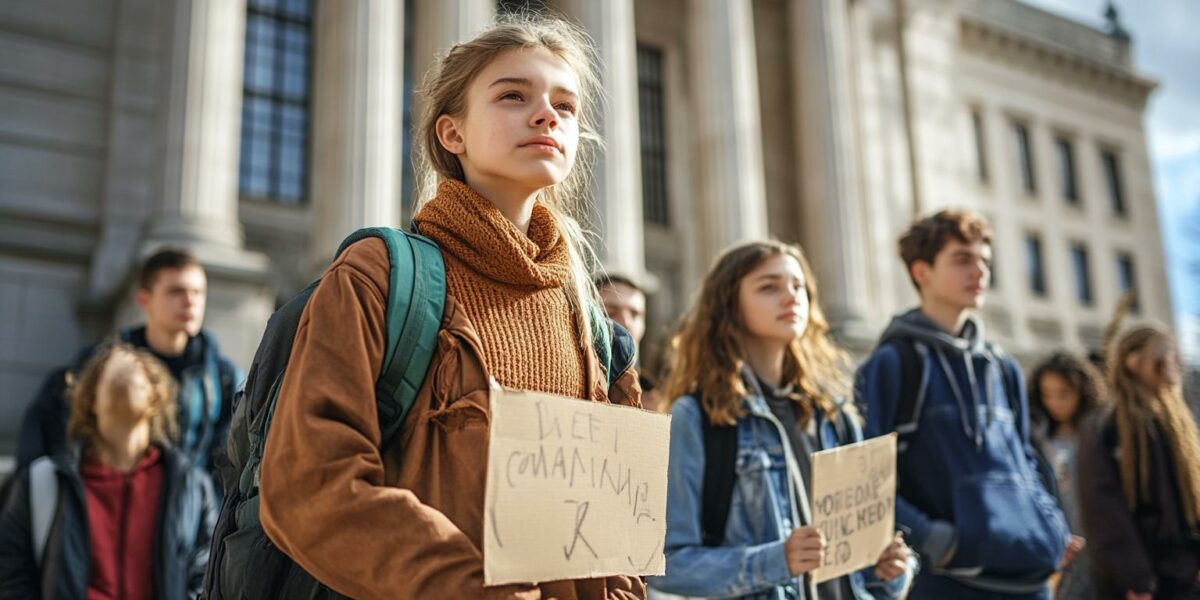Youth Activists Challenge Federal Climate Policy
Young climate advocates have taken a bold step by petitioning the U.S. Supreme Court to expedite their case against the federal government. This unprecedented move aims to bring about sweeping changes in climate policies. However, its potential implications have raised concerns among legal experts.
The activists argue that the government’s current policies are inadequate and fail to protect future generations. They believe that immediate action is necessary to combat the climate crisis. Their petition highlights the urgency and gravity of the situation, demanding a trial to address these critical issues.
Some lawyers worry that this tactic could set a risky precedent. By taking the case directly to the Supreme Court, it may restrict the ability of other groups to use the courts for climate litigation in the future. This concern underscores the high stakes involved in this legal battle.
Expert opinions are divided on the potential outcomes of this strategy. While some see it as a necessary step to force governmental action, others fear it could limit judicial avenues for future climate cases. The legal community watches closely as this case unfolds, aware of its potential to reshape climate litigation.
Legal Experts Weigh In on the Risks
Prominent legal scholars have voiced their opinions on the youth activists’ bold strategy. Some believe that engaging the Supreme Court at this stage is a high-risk, high-reward maneuver. The potential for a landmark decision is significant, but so are the dangers of an adverse ruling.
Others caution that the Supreme Court’s involvement at this juncture could backfire. If the Court dismisses the petition, it might discourage future climate litigation efforts. This could have a chilling effect on environmental advocacy through legal means, a concern shared by many within the community.
Key points raised by legal experts include:
- The potential for setting a negative precedent.
- The importance of maintaining judicial avenues for climate action.
- The balance between urgent action and long-term legal strategy.
These considerations highlight the complexity of the situation faced by young climate activists.
The debate also touches on broader issues within the legal system. How courts handle climate-related cases can have far-reaching consequences for environmental policy and advocacy. The outcome of this petition could influence how future cases are approached and litigated.
The Future of Climate Litigation
The youth activists’ case has sparked a broader conversation about the role of the judiciary in addressing climate change. Courts have become a critical arena for environmental advocacy, and this case could redefine that role. The stakes are high, as the decision could influence future legal strategies.
Supporters of the petition argue that bold actions are necessary to address the climate crisis. They believe that the urgency of the situation justifies taking risks to achieve meaningful change. This perspective emphasizes the need for immediate and decisive action to protect the planet.
Critics, however, remain cautious. They worry that an adverse ruling could undermine future efforts to use the courts for climate advocacy. This concern highlights the delicate balance between pushing for immediate action and ensuring long-term legal avenues remain open.
As the case progresses, all eyes are on the Supreme Court. The decision will not only impact the youth activists involved but also set a precedent for how climate cases are handled in the future. The legal community and environmental advocates are closely monitoring the developments, aware of the profound implications.
Implications for Environmental Advocacy
The outcome of this case could have significant implications for environmental advocacy. A favorable ruling might encourage more groups to pursue legal action to address climate change. Conversely, a negative outcome could deter such efforts, shaping the future landscape of environmental litigation.
Young activists are at the forefront of this battle, demonstrating their commitment to fighting for a sustainable future. Their actions underscore the importance of youth involvement in climate advocacy. This case highlights their role in pushing for governmental accountability and meaningful policy changes.
The legal strategy employed by these activists reflects a growing trend of using the courts to challenge inadequate climate policies. This approach aims to hold governments accountable and demand stronger actions to combat climate change. The success or failure of this tactic will influence future advocacy efforts.
Ultimately, the youth activists’ petition to the Supreme Court represents a pivotal moment in climate litigation. Its outcome will resonate beyond the immediate case, affecting future legal strategies and the broader fight against climate change. The world watches as these young leaders take a stand for environmental justice.



isabelleinfinity
How can we support these young leaders in their legal battle?
sofialabyrinth
Risky but necessary. Urgent action is needed to combat the climate crisis!
Harley
What do legal experts think about the long-term implications of this tactic?
Sadie
LOL, maybe they should ask Thanos for help. 😜
lucas
Thank you to these brave young activists. Your courage is inspiring!
olivia_whispering1
Why risk setting a negative precedent? Seems like a dangerous game.
chloexanadu
Wow, this is a bold move! Hope it leads to some real changes. 🌎
easton
Is this the first time youth activists have taken a case to the Supreme Court for climate change?